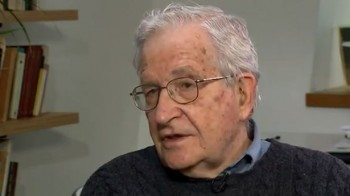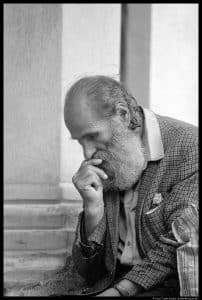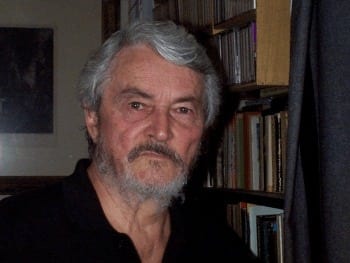TO BE A COMMUNIST
ESSAYS & Dispatches BY
Gaither Stewart
European Correspondent • Rome
![]() This essay is part of an anthology by the author to be published by Punto Press later this year.
This essay is part of an anthology by the author to be published by Punto Press later this year.
speak of myself as a Socialist but in my innermost self I think of myself as a Communist. I prefer the Communist name to the beautiful word “Socialist” because the latter has in many places been either altered, weakened, diluted, deformed, its real meaning betrayed by social democrats happy to do capitalism’s bidding, and it has become ambiguous and in some places has been ostracized as in the capitalist homeland, USA. As a rule the Socialist designation is qualified in one way or another so that it detracts from its real meaning: Democratic Socialist, National Socialist, Freedom Socialist, Progressive Socialist, ad absurdum. Anything you want it to mean. Still, although few Americans want to be known as Socialists, in recent times one hears it used more and more often, as in the organization, Socialists of America.
The term, Left, has also become insufficient since it falls into that same category of politically toxic ambiguity. In my native America many Democrats who behave and vote as rightists like to consider themselves of the Left. In my adopted country of Italy, Left or Center Left comprehends a varied assortment of ex-Christian Democrats, ex-Socialists (rightwing), rightwing labor leaders, populists, ex-Communists now of unidentifiable positions.
However, Communism is another story. In the West, though less ambiguous than Socialist, it is simply a bad word. Now, I do not insist that to be genuinely of the Left one must be a Communist … although admittedly it helps clarify where you stand. A Communist! some exclaim. Another story of mistaken paths. Someone once suggested that maybe I am in reality a Communitarian. Perhaps. Most certainly that too. However, the majority of the mainline Left, especially the intellectuals, will smirk: ‘In these times … since the Fall of the Berlin wall and the collapse of the Communist experiment, he still believes that. Tsk, tsk! A Communist! How naïve! Too bad!”

Patron saints of the “democratic left” like the venerable Noam Chomsky have long taken cheap shots at the Soviet Union and communism in general.
Not only right wingers like to point out Communism’s failures, especially the failures in Soviet Communism (many of them externally triggered), but also the professional anticommunist Left, chiefly comprised of comfortable liberals and apostates. The jeremiad of accusations is long and tiresome: the ironclad bureaucracy, the lack of “democracy” as the non-Communist West understands it, the corruption inherent in state planning and state ownership, the invasion of the state into the private lives of its citizens, police controls, the supposed horror of the gulags (amplified by uncorroborated, non-stop Western propaganda, as mentioned by Michael Parenti in his classic essay, The Overthrow of Communism), a one-party system representing only one class (which incidentally applies also to the United States, albeit in America that party represents only the infinitesimally small plutocracy and uses two different masks to fool the masses), the dichotomy between privileged Party class and the people (the income inequality between top Soviet politicians and the workers rarely exceeded a factor of 20 or 30, whereas in the West it is common to find magnates whose incomes represent thousands of times the earnings of average workers. The Critics chuckle, nudge each other and indulge themselves before arriving at the conclusion intended from the start: Communism in practice has never worked and will never work. The tragic irony is that many of the criticisms of Soviet Communism today apply to the USA and increasingly to the entire capitalist world.
Thus the necessity to revisit the old question arises again: how true is Western criticism of the Soviet experience in Communism? As a rule outright condemnation of Communism is based on prejudice. Knee-jerk prejudices inculcated into the populace, anti-Socialist/anti-Communist and anti-Russian propaganda infecting the entire lives of most people of the West. Actually more than mere propaganda, but hostility deeply engrained in the Western DNA from birth. Prejudices rarely reflect the truth. So what convinced me?
Well, I found in Marxist Socialism an inkling of what I desired: the intention of the deliverance of man from dependence on a rigged system of economics and his eventual victory over inhuman Capitalism which we see now from day to day on its shaky last legs.
So in that vein, a few words about Soviet Communism are in order: Communism in twentieth century Russia first of all must be compared with the horrors of the Tsarism it overthrew and replaced. Pre-revolutionary Russia was a country in which the masses consisted chiefly of poor, uneducated and subjugated peasants, a society in which inequality and injustice ruled. Thus Communism in Russia had a savage non-Communist pre-history. (Much to the chagrin of the right, it is always the brutal abuses of the “ancien regime” that literally beget the left.—Eds.)
Soviet Communism was also a very Russian system, the reasons for which date far back into the Russian nineteenth century: the enduring sense of guilt on the part of the educated upper classes and some of the nobility toward the suffering peoples. Their sense of guilt was, by way of example, much more powerful than white America’s sense of guilt toward its black slaves and now ex-slaves, a guilt which however affected the real powers in the USA in a minor way as compared to Russia.
Thus Russian revolutionaries had in common a trait absent in the West: a sense of deterministic guilt toward laboring people, especially the peasantry. On the other hand, Communism appealed to the deeply religious Russian masses also because of its common traits with Christianity: the people were deeply linked both to the land and to Russian Orthodoxy. Centuries before the arrival of the Bolsheviks, the world outlook—the mirovozreniye—of the masses was already collective—not individual—; they were mentally prepared for the message of Communism.
The educated upper classes felt guilty also because of their divorce from the land and a realization that their lives were based on the exploitation of the people’s labor on the land. The consciousness of the sin of their social position created a great sense of repentance in the upper classes. Greed and selfishness never played the role in Russia as in the USA. Many of the upper classes and nobility felt the loneliness of their guilty position and wanted to reunite with the land and the people.
If the upper classes were moved by guilt, the lower classes were moved by honor. Most Russians had always felt an aversion to the crass and greedy bourgeoisie and as the nineteenth century ended revolutionaries actually felt a dread of the bourgeois stage of Capitalism predicted by Marx, which they therefore hoped to avoid. Insurrection and immediate revolution was the only possibility for such an achievement, contrary to earlier Socialist theories. So it was not surprising that Tsardom was overthrown so quickly when the Communist-led revolt occurred and the Revolution began.
Predictably the capitalist world was terrified. Horrified by the words “Socialism” and “Communism”, the combined military forces of the capitalist world first attacked the Russian Revolution while it was underway, then for seventy years it isolated, denigrated, harassed, and embargoed the Soviet Union and still today anything that smacks of Communism or for that matter of Russia itself.
[dropcap]Y[/dropcap]et Russia had time, historically however only a short time—those seventy years—to offer a successful and appealing alternative to Capitalism, as predicted by Socialist theorists. Such background in the birth of Russian Communism and the example it set for much of the world derived from the sacred Russian conviction that Russia was destined to save the world: the dream of the Third Rome of devout pre-revolutionary Orthodox easily mutated into Communist messianism.
Such factors were missing and historically and socially impossible in Western Communism. When I began maturing socially and politically, the narrative of my more romantic self—my religious upbringing, my working class family, and also my farmer grandfather’s close link to the land—inclined me toward the messianic vision of Russian Communism. However, my Western world outlook and personal experience dictated Western-style Socialism/Communism as the model to be followed. Though models in Russian style revolution are spiritually inspiring, they are largely inapplicable—or have been thus far—in the West because of a total absence of the above discussed socio-political factors of pre-revolutionary Russia that made that revolution possible. Neither the penitent nobility-upper classes nor a communitarian peasantry existed in the West capable of creating the necessary revolutionary energy to hurtle the West toward another revolution, while at the same time the spirit of the English, French and American revolutions had extinguished long ago.
Socialism/Communism is the only force that has been capable of defeating Capitalism in many countries at once and of building new societies on its ashes, the ironic result of a century long battle for social justice, that Christian concept around which the Russian Revolutionary revolved.
[dropcap]S[/dropcap]ocial justice is the aspect of Communism that has appealed most to me personally and that came to appeal to billions of peoples of the world. That appeal has never died. Today many peoples of former Communist East Europe testify that they miss their lifestyle under the social state offered by Socialism/Communism. More and more peoples of East Europe today confirm their belief in the validity of Socialist tenets by voting back into a share of political power Communist or Socialist parties chiefly because Socialism has a soul—a social soul—which is lacking in Capitalism. Socialism’s soul is a secularized soul, yes, originally a rejection of pure religious-inspired spiritualism, but a soul based on the relation of man to man and not of man’s relation with industry or its socio-economic embodiment in institutionalized selfishness. In some places in the world there exists a growing realization that behind economic activity stand real people, people who can dissipate the ghostly world of totalitarian capitalist economics. This aspect of Marxism is no longer connected with materialism, but with socialist spirituality.
An article by a thirty-seven year old Russian woman that appeared in the Russian publication, Zavtra (Tomorrow), expresses explicitly what other persons from some of those peoples of Socialist East Europe have said to me:
Olga Lugovaya
Having grown up in a religious environment, I, like Olga, am haunted by the missing element in American society today: a deeply ingrained sense of social justice. I am bewildered, offended and horrified by the inequality in my native America, and now growing in my adopted Europe. I am outraged by the philosophy that greed is good. That everyone is encouraged to take all of everything one can. Not only the injustice of economic inequality but also the objective lack of equal opportunity. It is untrue that the poor choose to be poor. It is untrue that the riches in the hands of a few and little in the hands of the poor are the proof that the poor deserve their situation and would be forever satisfied with home, car and TV. Nor do I accept that anyone really wants to be dumb, even if many act as if they prefer ignorance.
Surveys show that a great majority of Earth’s population believe the major world problem is Capitalism—the exploitation of human beings, defenseless animals and nature by capital. For that reason I strongly favor investment of state funds and energies in public schools, free or easily affordable university study, free health care and free public urban transportation. That is, I favor a huge injection of the state into the everyday lives of peoples. Such vital matters in favor of peoples are what Socialism is about.
Still, it would be foolish of me to deny the influence of Russian Communism—the influence of the Socialist system, not the entire Soviet model—on my socio-political mindset of today. Russian Communism’s messianism and its vision of a future society no longer a slave of economics reflected my Christian religious/spiritual upbringing. It seemed to me—as it did to billions of people of the other world—that the lever to turn the world upside down had been found.
Nor can I deny the strong influence of the Socialism/Communism projected in West Europe where I began to mature intellectually. Europe’s absorption of many aspects of Socialism/Communism is reflected in the European welfare state constructed throughout the twentieth century—modern Europe’s great contribution to mankind that I call the European Idea—today being undermined and viciously unraveled by the same greedy Capitalism. But the Russian model also plays a role in my case because of my love for that land and for the accomplishments for the rest of the world of its Communism which was born and developed in a manner vastly different from that of the West, even though Western Communism was born from many aspects of the Russian experience.
So what Russian Communist influences do I have in mind?
It has been said that the entire history of the Russian intelligentsia beginning in the early nineteenth century was a preparation for Communism. The model developed in Russia included above all “the thirst for social righteousness and equality, recognition of the working class as the highest type of humanity, aversion to Capitalism and the bourgeoisie, the striving for an integrated world outlook and an integrated relation to life, sectarian intolerance, a suspicious and hostile attitude to the class of the cultured elite, an exclusive this-worldliness and a denial of the spirit and of spiritual values, a well nigh religious devotion to materialism.” However, I do not believe that my difficulty with the latter two traits, which place me in the Western camp of Communism, distance me from Communism as such.” (This paragraph is in reference to the Russian religious philosopher, Nicolas Berdyaev)
So again: why do I think of myself a Communist and not simply Leftist? Not even a radical Leftist which people tend to read simply as anarchist or “terrorist” (always a slippery, invidious word the latter; as Churchill recognized, ‘your terrorist is someone else’s freedom fighter’). I think of myself as Communist to avoid such confusion. I began thinking in this manner because of two principal aspects of Marxism: on the one hand, the fundamental nature of economics which determines a man’s social class that in turn determines his actions and thoughts. On the other hand, the spiritual side of Marxism that at first seems to contradict its economic determinism: the messianic role it assigns to working people—corresponding to the Christian doctrine of the primacy of the role of the meek and the poor—destined to free humanity from slavery. I find sufficient the idealism of Karl Marx to counter the dehumanization in Capitalism which makes man dependent on his own production.
In the USA someone comments, “Oh, then you’re a Democrat.”
“Of course not,” I reply.
In Italy the question is the same: then you’re for the Partito Democratico? My answer is the same: Of course not. Here you don’t know whether you’re voting for ex-Christian Democrats, rightwing Liberals or Republicans, or in the best of cases for an ex-Communist who changed his mind and abandoned core principles. No, I would not feel at home in any of those places.
Not that my non-support for such parties includes my vote for leftist parties in national elections. Not at all. I have never voted anywhere. Unbelievable to people who still believe in ballots and urns and election campaigns and its promises and financing and all that blather. No, I have never voted in any election. Anywhere. Ever. And I do not plan to begin voting now. I am glad Bill de Blasio and not another was elected Mayor of New York City and I would send congratulations to him. But I have no idea of who financed him to get there and what price he must pay for his funding. According to his PR and also rabid rightists, he is of the extreme Left. Very good … if he can change the complexion of Manhattan, which he has not done.
 So my position is more or less ideological. But Communist? one still wonders. Old-fashioned? Outdated? Tried and failed? Old Marxist stuff you heard about in school? Well, I say, fuck such conditioned reactions and fuck those who do the conditioning. Especially them.
So my position is more or less ideological. But Communist? one still wonders. Old-fashioned? Outdated? Tried and failed? Old Marxist stuff you heard about in school? Well, I say, fuck such conditioned reactions and fuck those who do the conditioning. Especially them.
[dropcap]M[/dropcap]eanwhile, fuck the Center, too. Above all, fuck the Center. The sense of marketing hype and political spin is only heightened by the fact that we are told that the Center is allegedly “persuadable”. For at the same time it is already the majority. That is right: we are told that the “New American Center” constitutes 51% of the electorate. That sounds like a corporate-funded centrist’s dream. So fuck the Center as well as the tamed Left, that is, the liberaloid and anti-Communist left.
Even less inspirational are voices that reluctantly acknowledge the status quo because of its inherent resistance against big change, certainly against revolution. Desperate jeremiads in America in times when even our brightest leaders fear ‘apocalypse now’ are commonplace. How the world escaped the global nuclear war calamity that bedeviled my childhood still seems miraculous. Or the equal horror that sprawling Communism would bury us. Reality outsmarts nearly all predictions, dire or otherwise.
Now we have terrorism to re-ignite current fear-thresholds; no mushroom clouds have outdone worldwide genocides since 9/11. The year 2001 sparked a mania. Excluding the Confederate rebellion leading to the American Civil War, our American legacy is so-called evolutionary reforms, not the massive upheavals of revolution. We have not had a revolution in centuries. Reform is the Left’s model of change. But what reforms? Reforms for the “worse” —the brand on which Barack Obama and corporatized Democrats seemed to specialize. And many more such reforms are surely on the way. Still, most of the rest of the world considers the home of global corporate totalitarian Capitalism, corporate democracy and corporate freedom, the good ol’ USA, the rogue super nation of the world. Rogue nation, the term once liberally applied by the USA to the “evil” empire of Communism, the USSR.
Filled with hubris from its inception, the exceptional USA still believes itself exempt from universal rules of behavior. The USA, where not only public ethics hardly exist, personal morality is also vanishing at an astonishing pace and few voices remain to confront inequality. Europe too is in fact turning its back on America, despite the enduring European belief in American democracy and capitalistic Europe’s stubborn imitations of America. So, for me, Europe and its dwindling welfare state are no longer acceptable models either. The question then is, what remains?

Italian journalist Giovannino Guareschi’s postwar satirical stories about the clash of wills between the local priest of a small Italian town (Don Camillo), and his nemesis, the Communist mayor, Peppone, were eventually taken to the screen with French comedian Fernandel in the eponymous role. What Peppone and Camillo have in common is an interest in the well-being of the town. They also appear to have both been partisan fighters during World War II; and while Peppone makes public speeches about how “the reactionaries” ought to be shot, and Don Camillo preaches fire and brimstone against “godless Communists”, they actually grudgingly admire each other. Therefore, they sometimes end up working together. Thus, although he publicly opposes the Church as a Party duty, Peppone takes his gang to the church and baptises his children there, which makes him part of Don Camillo’s flock. Peppone in many ways sums up the ambiguous attitude of many Italian communists toward the Church. (Don Camillo, Wikipedia)
Today many Italian Communists are Christians. A paradox. Italian Communists rediscovered the Catholic Church at the same time other Italians were moving away from it. The great majority of Italians today who are not agnostic are simply technical Catholics—baptized at birth, and go to church only for communions and funerals. The Church and faith mark the beginning and the end of life. All the inbetween is life itself. Because of the powerful presence of the Vatican in Rome, because of the Church’s anathemas and judgments on and invasions into civil issues like divorce and abortion and the hard Marxist-Leninist positions on religion in general, the religious question has always been difficult for Italian Communists. I do not forget one Rome Communist’s summation of the religious question precisely during the time Italian Communists began returning to the Church: “The Pope, his infallibility and his dogmas, the rites, myths, saints, all those millennial customs, and bureaucratic structures are a lot of nonsense. In that sense, Catholicism is the queerest sect of our times. Yet we respect the institution since it is so quintessentially Italian.” Ambiguous, but clearly not in conformity with Lenin who preached that “religion was purely a question of revolutionary conflict” while he summoned men to the “assault of heaven” and opposed any attempt to combine Christianity with Socialism.
Pure materialism is thus a complex question for me. I take exception to Christianity’s claim that the human soul is of more value than all the kingdoms of the world, yet I agree that every human being is individual and never to be repeated, a biological individualism which is not to be compared with the personality which belongs to the spiritual world, and which, in the final analysis, is a stumbling block for my Communism. I am not hostile to the individual man, the personality, who is more than a member of a social class. I consider myself a member of a spiritual human society which I nonetheless perceive of as an aspiration to classless society.
I have no doubts about the affirmation that “Capitalism dehumanizes human life”, as per Nicolas Berdyaev. Sometimes seen as a Christian Existentialist, Berdyaev was an early Marxist, who was exiled from Communist Russia in 1922 because of his severe views on Bolshevism. Yet his summation underlines the evangelical truth that man does not live by bread alone and that Communists cannot be condemned for showing that though bread alone is not enough, man still does live by bread and there must be enough of it for all. Therefore radical change is objectively necessary. Though the individual can be revolutionary, Berdyaev concludes, the masses are conservative. His conclusion is as terrifyingly realistic as it is discouragingly pessimistic for the forward-thinking Left in its struggle for social and political transformation.
![]()
 Our Senior Editor based in Rome, serves—inter alia—as our European correspondent. A veteran journalist and essayist on a broad palette of topics from culture to history and politics, he is also the author of the Europe Trilogy, celebrated spy thrillers whose latest volume, Time of Exile, was recently published by Punto Press.
Our Senior Editor based in Rome, serves—inter alia—as our European correspondent. A veteran journalist and essayist on a broad palette of topics from culture to history and politics, he is also the author of the Europe Trilogy, celebrated spy thrillers whose latest volume, Time of Exile, was recently published by Punto Press.
=SUBSCRIBE TODAY! NOTHING TO LOSE, EVERYTHING TO GAIN.=
free • safe • invaluable
[email-subscribers namefield=”YES” desc=”” group=”Public”]

